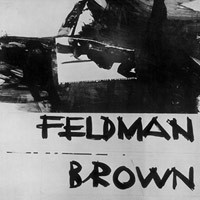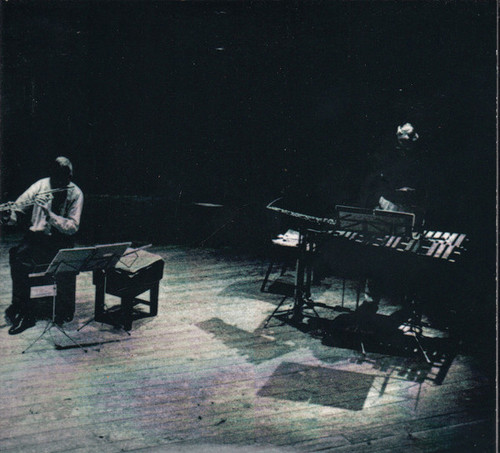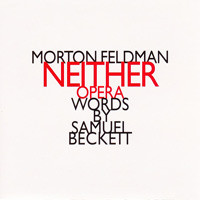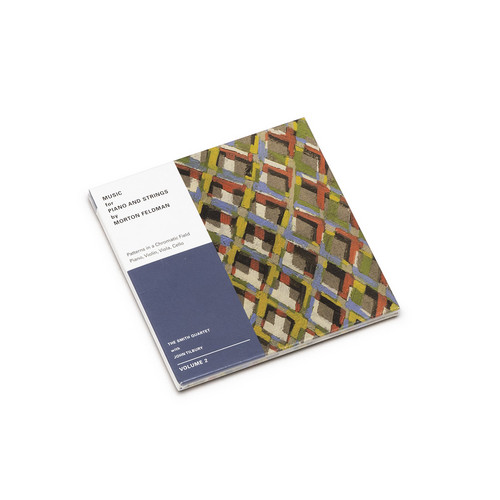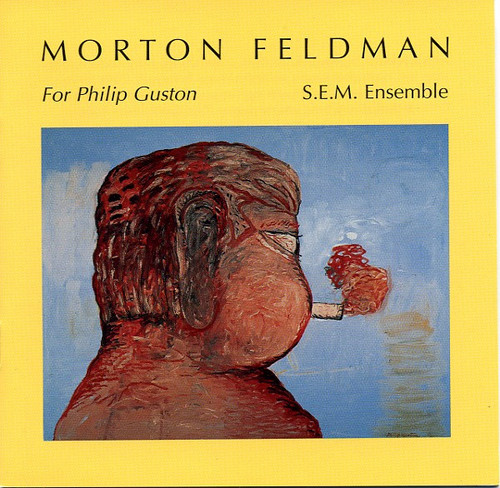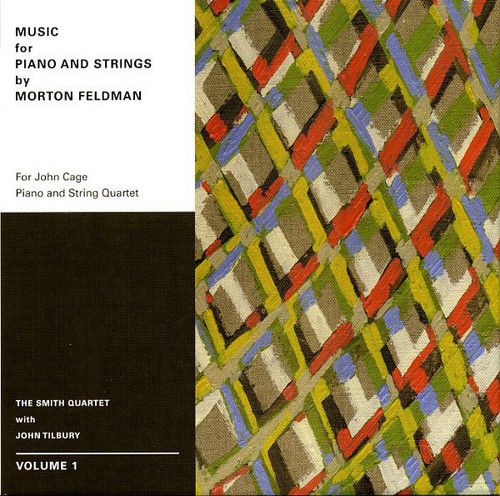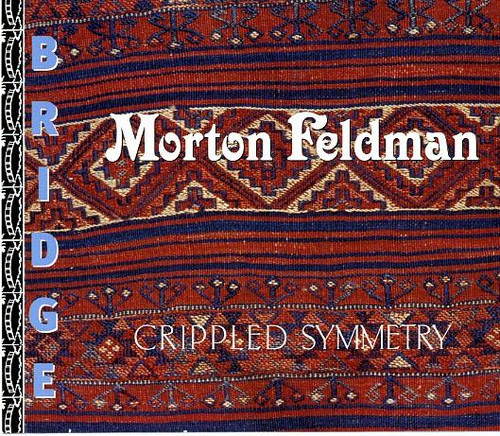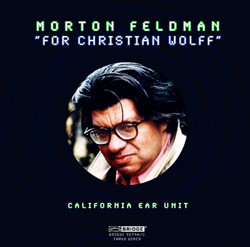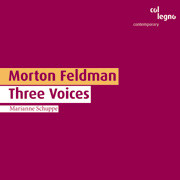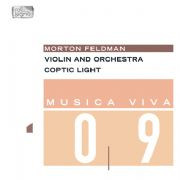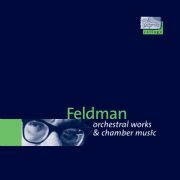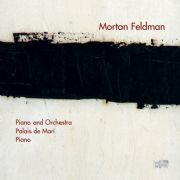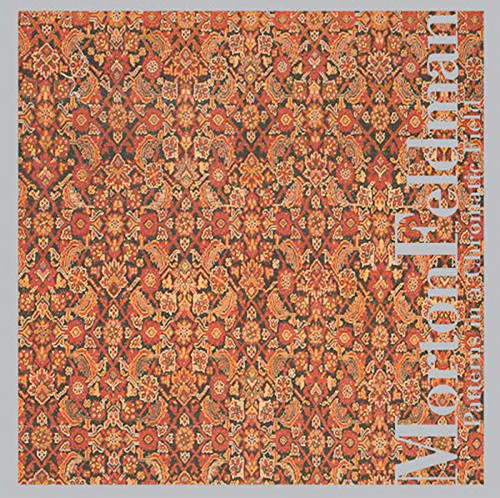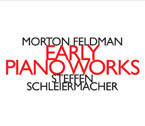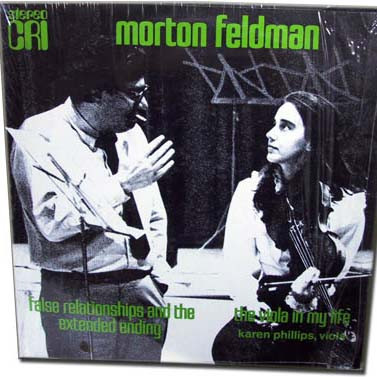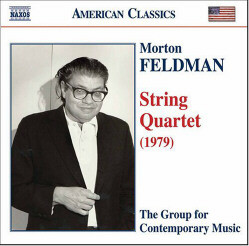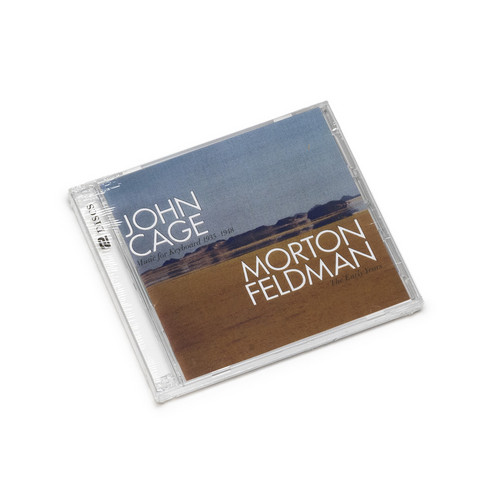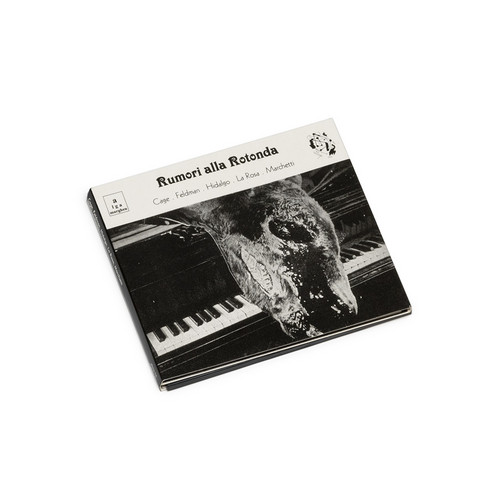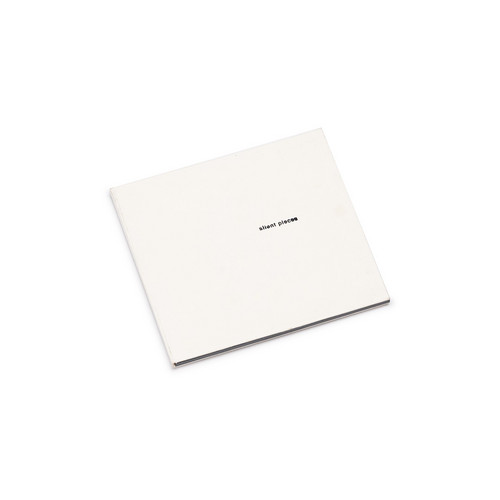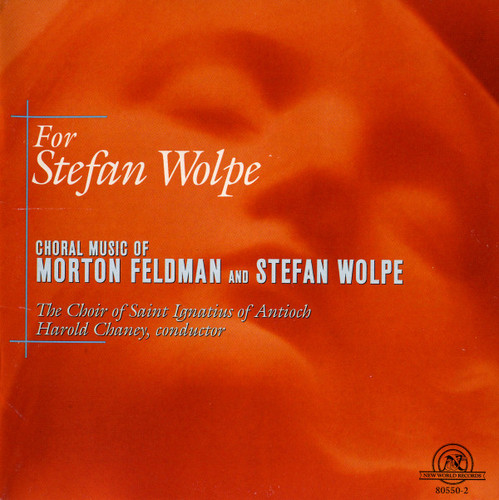Morton Feldman
Morton Feldman (January 12, 1926 – September 3, 1987) was an American composer, born in New York City. A major figure in 20th-century music, Feldman went through several compositional phases. He was a pioneer in aleatoric music and indeterminate music, and in music requiring improvisation. His works are characterized by quietness, slowness, and often by their extreme length, especially in his later music.
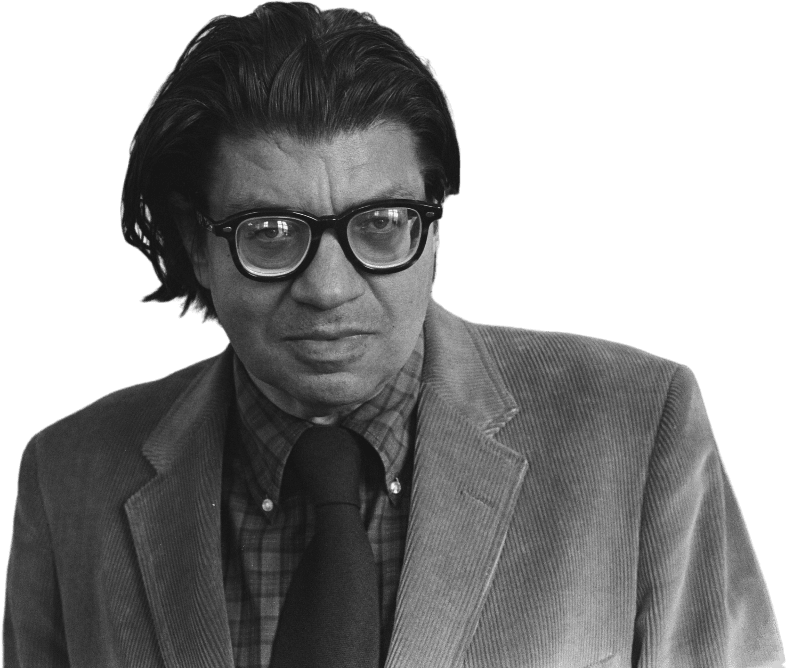
Morton Feldman (January 12, 1926 – September 3, 1987) was an American composer, born in New York City. A major figure in 20th-century music, Feldman went through several compositional phases. He was a pioneer in aleatoric music and indeterminate music, and in music requiring improvisation. His works are characterized by quietness, slowness, and often by their extreme length, especially in his later music.
Morton Feldman / Earle Brown
Finally back in print. This rare Morton Feldman /Earle Brown split LP was originally released in 1962 on the small NY-based Time Records and features Feldman's 'Durations I-IV' on side A and Brown's 'Hodograph I,' 'Music for Violin, Cello and Piano' and 'Music for Cello and Piano' on side B. David Tudor is featured on piano throughout. Feldman and Brown, who were both interested in non-traditional systems of notation and improvisation, were very closely aligned with the New York School, a group …
Crippled Symmetry, live at June in Buffalo
Restocked. In 2000, Eberhard Blum (flute, alto flute, bass flute), Nils Vigeland (glockenspiel, vibraphone) and Jan Williams (piano, celesta), American composer Morton Feldman's close friends and collaborators, came together once more as The Feldman Soloists to perform Crippled Symmetry, the trio Feldman composed for them, on the 25th anniversary celebration of June in Buffalo, the festival he founded. The recording of this concert is now finally available on CD, and is destined to become the…
Neither
Neither has been identified by some as an opera (it was commissioned by the Rome Opera) but it makes use of none of the conventions of traditional opera. There is no story, no mise-en-scene. The intensity results from emotional/aesthetic tension, not plot manipulation or character confrontation. The music does not attempt to accompany or depict the text in the usual fashion; instead Feldman has created a kind of musical equivalent to the environment that Beckett's words suggest, invoking …
Music for Piano and Strings by Morton Feldman. Volume 2
The 2nd volume of "Music for Piano and Strings" by Morton Feldman is performed by The Smith Quartet with John Tilbury, presenting "Patterns In a Chromatic Field", and "Piano, violin, Viola, Cello", on DVD audio to allow for the length of these large works
Several lifetimes ago, when I was nineteen, I was interviewed by Wilfrid Mellers for a place at York University. That I failed to win a place may have been due in part to the confinement of our discussions to the music of Morton Feldman. Wilfr…
For Philip Guston
Originally released in 2000. Looking for just one Morton Feldman CD to give to someone that you like more than yourself? There's more than one correct answer to this elusive question, but this overwhelming set (closing in on 300 total minutes) is an utter classic, with paralyzing sonic power. Feldman is recognized as one of the 20th century's most influential composers. Feldman's artistic principles were shaped in the early 1950s by his association with composers John Cage, Earle Brown and…
Music for Piano and Strings by Morton Feldman. Volume 1
The Smith Quartet with pianist John Tilbury perform two long works by Morton Feldman: "For John Cage" (1982) and "Piano and String Quartet" (1985) on DVD Audio. Several lifetimes ago, when I was nineteen, I was interviewed by Wilfrid Mellers for a place at York University. That I failed to win a place may have been due in part to the confinement of our discussions to the music of Morton Feldman. Wilfrid (a friend of Feldman's and, in later years, a friend of mine) saw Debussy as a powerful influ…
Crippled Symmetry
orton Feldman's music continues to exert its fascination on listeners and record companies alike. After releasing its highly successful recording of the more than three-hour-long For Philip Guston, Bridge once again returns to the California EAR Unit for Crippled Symmetry, at only 87 minutes a mere bagatelle in terms of Feldman's late output. Well, maybe not. Scored for flutes, mallet percussion, and piano/celeste, Crippled Symmetry does exactly what the title says: it toys with not quite exact …
For Christian Wolff
For Christian Wolff is one of Morton Feldman's final compositions, and stands alongside the four-hours-plus For Philip Guston, the 70-minute For John Cage, and the six-hour String Quartet II. Writing about hearing this work, Christian Wolff says that 'I found the experience of listening to it beautiful and interesting -- it moves away partly from our (Morty's, John Cage's and mine) original preoccupation with just sound and sonority into areas of self-awareness about listening, being a listener,…
Three Voices
This piece is sung by the Swiss “deep voice”, Marianne Schuppe in trio with herself, a feat made possible by playing back recordings of her own voice. This is not minimal music; melodic lines arise, sensual, beautiful, and undoctored, swaying like a lullaby, yet boosting the overall rhythmic intensity. There cannot be many works which demand of the soloist such careful timing, intense concentration and voice control.
Violin and Orchestra / Coptic Light
Morton Feldman dedicated a whole series of compositions to the relationship between solo instruments and the orchestra: after Cello and Orchestra (1972), Piano and Orchestra (1975), Oboe and Orchestra (1976) and Flute and Orchestra (1977/78) his Violin and Orchestra (1979) marks the conclusion of these "relationship works." The variety of sound accumulated around the violin, or through the violin, in less than an hour's time ranges from delicate whispers to cantilenas in rich tones and sharp rep…
Orchestral Works & Chamber Music
In the early 1970s Feldman increasingly turned his attention to works for orchestra, in most cases combined with a solo instrument, like Piano and Orchestra (1975). One aspect that was important to him in all of these works was a research into sound, an "unceasing effort to create, by way of exclusion and integration, by operating with colored projection surfaces and various spatial levels, a kind of self-supporting structure elastic enough to take up the exactly fixed initial impulse and contin…
Piano and Orchestra, Palais de Mari, Piano
In the early 1970s, Feldman increasingly turned his attention to works for orchestra, in most cases combined with a solo instrument. The compositions dating from this period include, among many others, Cello and Orchestra (1972) or Oboe and Orchestra (1976). One aspect that was important to him in all of these works was a research into sound, an "unceasing effort to create, by way of exclusion and integration, by operating with colored projection surfaces and various spatial levels, a kind of se…
Patterns In A Chromatic Field
Performed by: Charles Curtis (cellos), Aleck Karis (piano); recorded 2003. The definitive recording of one of Morton Feldman's most important and challenging pieces, played at the composer's marked tempos, and taking all the notated repeats. Fitting neatly onto one CD, this is Feldman at his most extreme. A dramatic display of virtuosity performed with passion and precision by two of the leading exponents of new music in the world. Out of Feldman's enormous oeuvre, Patterns in a Chromatic Field …
Early Piano Works
For each ecstatic instant / We must an anguish pay / In keen and quivering ratio / To the ecstasy." It almost seems as if Emily Dickinson could have been describing the early piano music of Morton Feldman when she wrote those lines nearly one-hundred-and-fifty years ago. Certainly, the uncommonly short, acutely concentrated, unadorned and vulnerable pieces Feldman composed between 1950 and 1964 each span just an “ecstatic instant” — a brief, heightened experience measured not according to time b…
Viola In My Life / False Relationships
False Relationships and the Extended Ending" alternates between exact proportions and "free time" in the vertical style (slowly changing chords, common-tone suspensions etc. in works such as "Atlantis" (1958) and "The Swallows of Salangan" ) which came after the counterpoint style of the early 50's graph pieces. "The Viola in My Life" (composed especially for Karen Phillips) was the next development adding melody-like gestures. Ethereal, heartfelt. Only one copy available.
String quartet (1979)
Morton Feldman’s String Quartet (1979) follows over a decade of compositional activity where the composer was constantly occupied with a new piece for orchestra. In the eleven years before the Quartet he produced fifteen orchestral works, beginning with On Time and the Instrumental Factor (1969) up to Violin and Orchestra (1979). In the following eight years only three orchestral works were written, The Turfan Fragments (1980), Coptic Light (1986) and For Samuel Beckett (1987). With the String Q…
Music For Keyboard 1935-1948 / The Early Years
This double-CD set combines two of the key titles of Columbia Records's
legendary "Music of Our Time" series curated by David Behrman. Jeanne
Kirstein's recording of Cage's early keyboard works remains a touchstone
of Cagean interpretation notwithstanding the passage of time. Christian
Wolff recalls, "I remember Cage saying that Jeanne Kirstein's playing
caught the spirit in which the pieces were written at the time he wrote
them-a kind of simple excitement and enthusiasm (also, surely, ou…
Rumori alla Rotonda
Live recording at the Rotonda del Pellegrini, Milan, January 21st, 1959 featuring John Cage, Morton Feldman, Juan Hidalgo, Leopoldo La Rosa, and Walter Marchetti. Among all the events involving John Cage during the long stay in Europe that followed his controversial appearance at Darmstadt Ferienkurse in September 1958, the concert he held in Milan on January 21st perhaps represents a less well known episode.
Featuring Cage's intervention both as composer and performer of one's own work as well …
Silent Pieces - Live At Dacapo II
1995 release ** Special members-only edition for the sponsors' circle of dacapo. Music by: Anton Webern, Morton Feldman, John Cage, Hans Otte, Malcolm Goldstein, Dietrich Eichmann, Yoshikazu Iwamoto.
Choral music of
Choral Music of Morton Feldman and Stefan Wolpe
Stefan Wolpe (1902-1972), one of the great teachers in
twentieth century music, is also now recognized as one of its most
significant composers. His Two Chinese Epitaphs, composed in
Jerusalem in 1937, illustrates the composer's deep allegiance to
socialist issues. He wrote the work swiftly and in anger, just after
learning that the Basque town of Guernica had been bombed by the
Fascists the previous week. He chose to set two poems by Louise …
